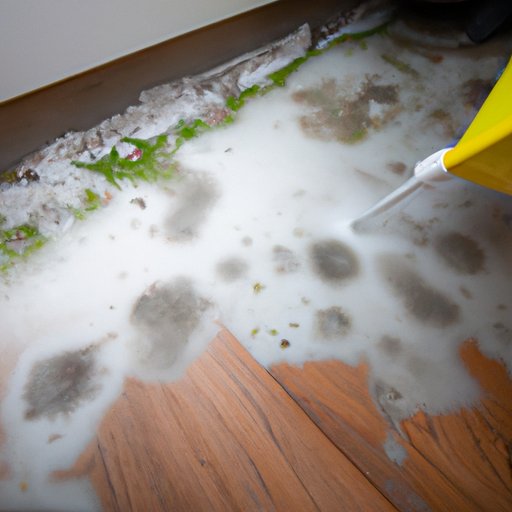
Introduction
Mold is a common problem in many homes and can cause serious health issues for you and your family. It can grow in damp environments, such as the bathroom, kitchen, or basement, and can release spores that can trigger allergies or respiratory problems. In this article, we’ll explore how to clean mold off walls and prevent future growth.
Step-by-Step Guide on Cleaning Mold off Walls
Before starting to clean mold, it’s important to identify the type and the extent of the mold growth. Wear protective gear, such as gloves and a mask, to prevent inhaling mold spores or getting them on your skin. Next, prepare a cleaning solution, either a mixture of vinegar and water, baking soda and water, or bleach and water. Apply the solution to the moldy area, scrub it off with a brush, and wipe it down with a damp cloth. Finally, make sure to dry the area thoroughly and dispose of any materials that were contaminated with mold.
Dangers of Mold and Ways to Prevent Future Growth
Mold spores, when inhaled, can cause a range of health issues, especially for those with allergies or breathing problems. To prevent mold growth in the future, it’s important to fix leaks, increase ventilation, and reduce moisture in the air. Monitor the humidity level in your home and use a dehumidifier if necessary. Additionally, regularly clean and dry damp areas like bathrooms and basements, and use mold-resistant products where possible.
Common Areas Where Mold Grows in Homes and How to Address Them
Mold is most commonly found in damp areas like bathrooms, kitchens, basements, and attics. In the bathroom, make sure to clean and dry the shower, bathtub, and sink regularly and use a fan or dehumidifier to remove excess moisture. In the kitchen, wipe down surfaces and keep the area well-ventilated. In the basement and attic, seal any cracks or leaks and use a dehumidifier to remove moisture. Regularly inspect these areas for any signs of mold growth.
How to Identify Mold and When to Seek Professional Help
Mold can appear as black, white, green, or gray spots on walls, ceilings, and floors, and can also have a musty odor. If you notice a small amount of visible mold, you can often clean it yourself. However, if the mold covers a large area or returns after cleaning, or if you experience symptoms such as coughing, wheezing, or skin irritation, seek professional help. A professional mold removal company can inspect your home, identify the type of mold, and safely remove it using specialized equipment and techniques.
Professional Mold Removal Services and Choosing the Right One
Professional mold removal services can provide a more thorough and effective cleaning of mold growth, especially for severe cases. When choosing a professional mold removal service, look for a company with experience, certifications, and strong recommendations. Check their references and reviews and make sure they offer a guarantee of their work.
Importance of Regular Air Quality Testing and Ventilation
Air quality testing can help detect mold spores and other pollutants in your home that may be affecting your health. Make sure to regularly clean and replace your air filters and use a high-efficiency particulate air (HEPA) filter to capture mold spores. Increase ventilation by opening windows or using fans, especially in high-humidity areas where mold is prone to grow.
Conclusion
Cleaning mold off walls is essential for maintaining a healthy home environment, but it’s important to take the right precautions and know when to seek professional help. Regularly inspecting your home for mold growth, maintaining good air quality, and following the steps outlined in this article can help prevent mold growth and keep you and your family healthy.





